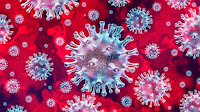Coronaviruses (CoV) are a large family of viruses that
cause illness ranging from the common cold to more
severe diseases such as Middle East Respiratory
Syndrome (MERS-CoV) and Severe Acute Respiratory
Syndrome (SARS-CoV). Coronavirus disease
(COVID-19) is a new strain that was discovered in
2019 and has not been previously identified in humans.
Coronaviruses are zoonotic, meaning they are
transmitted between animals and people. Detailed
investigations found that SARS-CoV was transmitted
from civet cats to humans and MERS-CoV from
dromedary camels to humans. Several known
coronaviruses are circulating in animals that have not
yet infected humans.
Common signs of infection include respiratory
symptoms, fever, cough, shortness of breath and
breathing difficulties. In more severe cases, infection can
cause pneumonia, severe acute respiratory syndrome,
kidney failure and even death.
Standard recommendations to prevent infection
spread include regular hand washing, covering mouth
and nose when coughing and sneezing, thoroughly
cooking meat and eggs. Avoid close contact with anyone
showing symptoms of respiratory illness such as coughing
and sneezing.

















